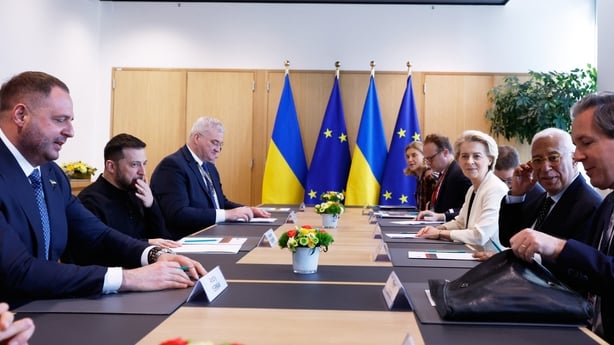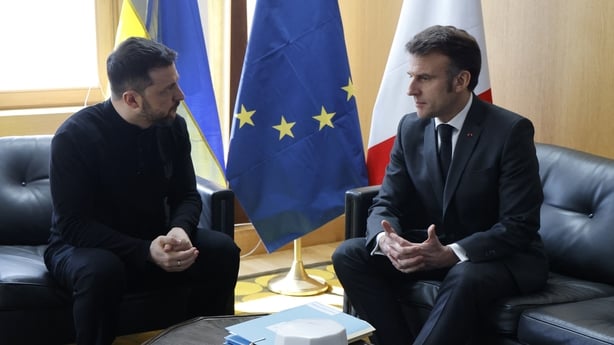European Union leaders have rallied around Ukraine and agreed to boost the bloc's defences at a summit, as the United States said that talks with Kyiv were back on track to secure a ceasefire in Ukraine.
Ukrainian President Volodymyr Zelensky attended the talks in Brussels a week after his heated White House encounter with US President Donald Trump led to the United States cutting off military aid and intelligence-sharing with Kyiv.
The US move away from Ukraine and its European allies has put pressure on EU governments.
The 27 leaders agreed a plan - drawn up by the European Commission - that aims to mobilise €800 billion to "re-arm Europe" against the perceived threat from Russia.
"Europe faces a clear and present danger, and therefore Europe has to be able to protect itself," European Commission President Ursula von der Leyen told reporters.
She described it "a watershed moment" for Ukraine and the continent.
The defence plan allow states to spend much more - at a time when Germany's leader-in-waiting Friedrich Merz is accepting radical reforms to fund the country's rearmament.
We need your consent to load this rte-player contentWe use rte-player to manage extra content that can set cookies on your device and collect data about your activity. Please review their details and accept them to load the content.Manage Preferences
French President Emmanuel Macron has called for a defence spending surge and said he would discuss extending the country's nuclear deterrent to European partners - an idea swiftly welcomed by several EU members but criticised by Russia.
President Zelensky sought to mend fences with Washington in the aftermath of his meeting with Mr Trump.
He declared himself ready to work towards a peace deal under the US president's "strong leadership" and to finalise an agreement on US access to Ukrainian mineral resources.
Saying he was "pleased" by the "apology" from Ukraine leader's, the US envoy on the Russia-Ukraine conflict announced that new talks were planned.
Steve Witkoff said he expected to travel to Saudi Arabia to speak to Ukrainian negotiators about an "initial ceasefire" and a "framework" for a longer agreement.
A senior official in the Kyiv said the delegations are expected to meet on Tuesday.
President Zelensky told EU leaders that Ukrainian and US negotiators had "resumed work".
"We hope that next week we will have a meaningful meeting," he said.

The EU also voiced support for Ukraine, but that statement was agreed without Hungary's Prime Minister Viktor Orban, an ally of Mr Trump, who is also working to develop ties with Russia.
Mr Zelensky thanked the leaders for standing by Ukraine, saying: "We are very thankful that we are not alone".
Germany's outgoing leader Olaf Scholz reiterated European warnings against any "dictated peace" in Ukraine. A future settlement must guarantee Kyiv's "sovereignty and independence", he said.
President Trump's outreach to Russian President Vladimir Putin to end the three-year war - sidelining both Kyiv and its European partners - has thrown Europe into crisis mode and drawn the UK closer to the bloc.
British Prime Minister Keir Starmer is working with Mr Macron to rebuild bridges between Mr Trump and Mr Zelensky.
They have pitched a one-month truce "in the air, at sea and on energy infrastructure" and called for a "coalition of the willing" to help secure a ceasefire.
A UK official said that talks with around 20 countries are under way.

EU leaders are discussing more broadly what "security guarantees" the bloc might provide for a peace deal, including the possible deployment of European troops, something several states support.
However, Russia reiterated that it would not accept European forces in Ukraine, nor a temporary truce, saying that a "final settlement" is needed.
Despite the European show of support for President Zelensky at the summit, there were no major new announcements of aid for Kyiv, beyond the €30bn the EU has already earmarked for this year.
But Norway, a non-EU member, announced that it will more than double its aid to Ukraine this year, bringing the total to around €7bn.
Several member states argue that Europe has enough money committed to meet Kyiv's needs - despite the US freeze on aid.
This week the Irish Government agreed to provide a further €100 million in non-lethal military assistance to Ukraine.
Any peace deal on Ukraine must ensure Russia's security - Putin
Russian President Vladimir Putin has said Russia should choose a peace in Ukraine that will ensure the long-term security of Russia and its sustainable development.
"We must choose for ourselves a peace option that will suit us and that will ensure peace for our country in the long term," Mr Putin told women who have lost relatives in the war.
"We don't need anything else's, but we won't give up our own," Mr Putin said.
Asked by a mother of a fallen soldier if Russia would retreat, he said that Russia did not intend to do that.

